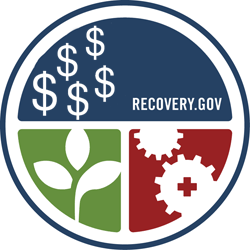 Today's roundup of stimulus coverage:
Today's roundup of stimulus coverage:
Stimulus funds helped push spending by state and local governments up 4.8 percent in the second quarter, reversing six months of spending decreases, according to data from the Bureau of Economic Analysis reported in USA Today. The newspaper adds that federal money "is now the No. 1 revenue source for state and local governments, surpassing sales and property taxes."
Local and state governments spent $21.4 million on lobbyists between April and June, an increase of 2.7 percent over the first quarter, the Wall Street Journal reports, citing data from the Center for Responsive Politics. About a quarter of the 1,000 different governments surveyed by the organization reported lobbying specifically about the stimulus. The Journal adds that governments often pay $10,000 to $30,000 each quarter to keep a lobbyist on retainer, with some governments paying multiple firms to lobby on their behalf.
The head of a key national contractors' association has criticized the pace of stimulus spending, reports the Greenville News in South Carolina. Stephen Sandherr, chief executive of the Associated General Contractors of America, said that while the stimulus has helped the construction industry avoid further job losses, slow spending by other agencies, including the Army Corps of Engineers and the Environmental Protection Agency, has dulled the impact of the stimulus on hiring. "The stimulus is clearly working," Sandherr was quoted as saying. "It just isn't working fast enough for many construction workers in many communities."
Steve Forbes has come out against a second stimulus package, calling the idea "crazy" and arguing that the move would further weaken the dollar. Writing on the Web site of Forbes magazine, he also criticizes the way the current stimulus has been spent. "The government is wasting money on pork barrel projects designed to keep congressional incumbents in their seats," Forbes writes. "President Obama has gone on the greatest check-writing binge in our history, with the exception of the Civil War and World War II."
John McCain was more generous. "It's very clear that the stimulus has had some effect," the former Republican presidential nominee told CNN's "State of the Union" in an interview taped Friday. "And I'll be glad to give him credit for that." McCain went on to ask whether the increase in the national debt that stems from the stimulus is beneficial to the country, calling the short-term benefit of the stimulus "generational theft."
Are you tracking the stimulus? ProPublica has set up a mailing list for reporters covering the stimulus, and you're welcome to join.



